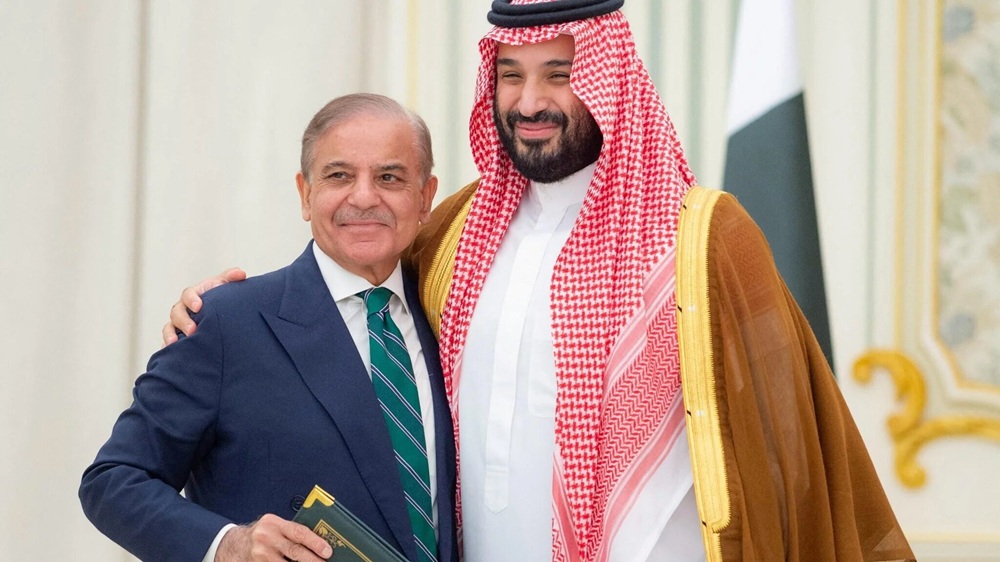
Saudi–Pakistan Mutual Defense Pact Signed
Saudi Arabia and Pakistan have formalized a new security accord that both capitals describe as a mutual defense pact. Saudi Arabia signs mutual defence pact with nuclear-armed Pakistan cements decades of cooperation and, crucially, elevates it into treaty-grade deterrence.
What the pact does
According to the joint statement, the pact frames an attack on either state as an attack on both. In practice, Saudi Arabia signs a mutual defense pact with nuclear-armed Pakistan to coordinate planning, capability development, and rapid response against external aggression. The language signals joint deterrence and creates clearer tripwires for assistance.

RSAF F-15Cs escorting PAF plane carrying Pakistan’s prime minister—Saudi–Pakistan Mutual Defense Pact Signed
Scope and doctrine
Officials characterized the arrangement as comprehensive and defensive. While they avoided technical specifics, Saudi Arabia signing a mutual defense pact with nuclear-armed Pakistan implies integration across air, land, maritime, cyber, and intelligence domains. Consequently, both sides can align command relationships, logistics pipelines, and rules of engagement faster in a crisis.
Not aimed at one actor
Riyadh stressed that the agreement institutionalizes existing collaboration rather than targeting a specific country. Even so, Saudi Arabia signing a mutual defense pact with nuclear-armed Pakistan will shape regional risk calculus by raising the costs of coercion against either partner.
Strategic context
Recent regional shocks framed the timing. After a contentious escalation in the wider Middle East, Saudi Arabia signed a mutual defense pact with nuclear-armed Pakistan as Arab and Islamic forums called for restraint while preparing for contingencies. As a result, both leaderships sought predictable mechanisms to manage spillover risks.
Balancing ties with India
Saudi Arabia underscored that its growing relationship with India remains vital. That said, Saudi Arabia signing a mutual defense pact with nuclear-armed Pakistan adds a parallel pillar with Islamabad. This dual-track approach aims to preserve economic momentum with New Delhi while bolstering security assurances with Pakistan.
Operational implications
Interoperability and exercises
For over half a century, Pakistani officers have trained Saudi units, building trust and shared tactics. Building on that base, Saudi Arabia signs a mutual defense pact with nuclear-armed Pakistan to expand joint exercises, air-defense integration tests, and maritime security patrols. Expect more standard operating procedures, shared targeting processes, and common communications protocols.
Logistics and sustainment
Stockpiling, maintenance standards, and spare-parts agreements matter as much as strategy. So, when Saudi Arabia signs a defence agreement with nuclear-armed Pakistan, it probably involves detailed planning for logistics, having supplies ready in advance, and sharing access to facilities in case of emergencies

Deterrence signalling
The agreement’s “attack on one is an attack on both” clause is classic extended-deterrence signalling. Because Saudi Arabia signed a mutual defense pact with nuclear-armed Pakistan, adversaries must now account for a pooled response matrix—from air policing and missile defense to maritime interdiction and rapid ground reinforcement.
Political-military takeaways
Institutionalization over ad hocism: The move replaces case-by-case coordination with standing frameworks. Thus, Saudi Arabia signs a mutual defense pact with nuclear-armed Pakistan to reduce decision latency in fast-moving crises.
Capability aggregation: Combining surveillance, training pipelines, and expeditionary readiness increases resilience. Hence, Saudi Arabia signs a mutual defense pact with nuclear-armed Pakistan to amplify each partner’s comparative strengths.
Regional risk management: The accord aims to discourage opportunistic escalation by clarifying red lines. Ultimately, Saudi Arabia signs a mutual defense pact with nuclear-armed Pakistan and seeks stability through credible, mutually assured assistance.
References
- Saudi Press Agency – Official statements: https://www.spa.gov.sa/
- Reuters – Middle East and Pakistan security coverage: https://www.reuters.com/world/
- Government of Pakistan, PM Office – Press releases: https://pmo.gov.pk/
- Pakistan Armed Forces (ISPR) – Official media: https://ispr.gov.pk/









